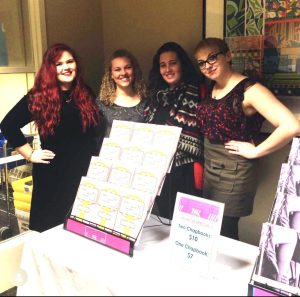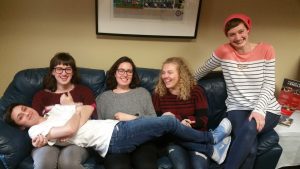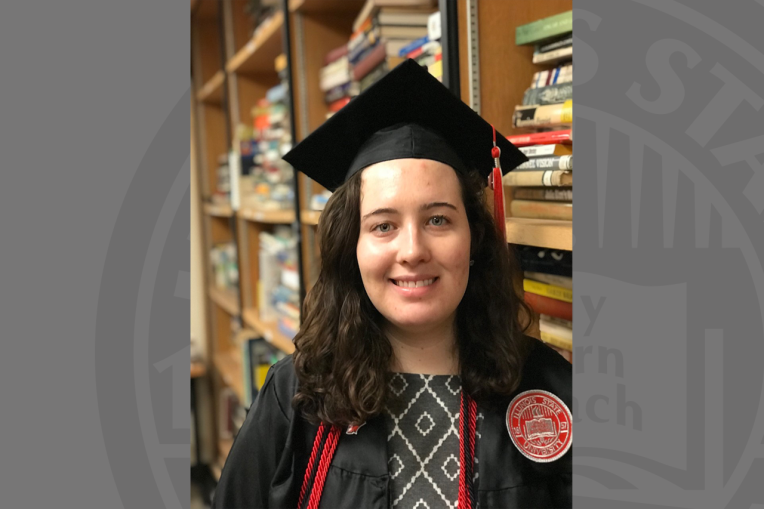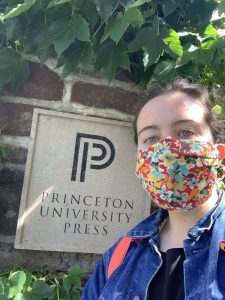Brigid Ackerman ’17 is an Illinois State University alum of the publishing studies program in the Department of English, who also received a minor in Spanish. As an undergraduate at Illinois State, Ackerman served as a production intern at the English Department’s Publications Unit, an editorial intern for Obsidian: Literature & Arts in the African Diaspora, and a copy editor and night editor at The Vidette. Additionally, she became a member of the international English Honor Society Sigma Tau Delta, assisted study abroad and international students at the University in various mentorship positions, and served as a production/design intern for Yale University Press in Connecticut. Ackerman has also published some of her writing at The Vidette and in Illinois State’s Grassroots Writing Research Journal.
Following the completion of her degree, Ackerman began a career in the publishing field at Princeton University Press where she worked in production and publishing operations for over three years. She then obtained a position at the University of Chicago Press as a design and production specialist. In this position, Ackerman assists her department in a myriad of ways, combining skills in both production and operations to develop a final product with her colleagues. With her education at Illinois State University, Ackerman has been able to solidify herself in the university press publishing field and kickstart a career she is passionate about. In this article, Ackerman discusses her time at Illinois State and how it has prepared her for where she is today.
Building a foundation at Illinois State University
When thinking about college, Brigid Ackerman wasn’t sure what she wanted to study. With a wide range of interests, from engineering to general English studies, Ackerman had a difficult choice ahead. It wasn’t until she learned about the field of publishing, and specifically the publishing studies program at Illinois State University, that her decision was finalized.

“Publishing seemed like a great option for me since the field has so many facets to it; I knew I could explore and find my way to a path that was the best fit for me,” Ackerman says. With this opportunity for exploration, along with an established professional publishing organization like the Publications Unit right on campus and the requirement for an internship to complete the program, Ackerman knew that publishing studies at Illinois State was right for her.
After a few years at Illinois State and some copyediting experience at the University’s student-run news organization The Vidette, Ackerman secured an undergraduate production intern position at the English Department’s Publications Unit, which she describes as “the most seminal experience [she] had in college.”
Joining other interns for roundtable discussions about topics important in the publishing world stands out as a memorable experience from her internship. By focusing in on the publishing industry and learning more about what goes on in the field, Ackerman was able to gain an understanding of the current state of publishing and the options open to her after college. Regarding the conversations on publishing, she says, “These are topics that are still relevant today and have a direct effect on my job.”
“My time at the Publications Unit laid a great foundation for the other internships I pursued, by providing both knowledge and creating talking points in interviews.”
—Brigid Ackerman
Another experience that was especially meaningful from Ackerman’s time at the Publications Unit is the work she did on the Illinois English Bulletin, including typesetting the text and the more difficult attributes, like tables and graphs, and using Adobe Creative Suite’s page layout design program, InDesign. Remembering the tricky typesetting and the way she developed the ability to try new things with the program, Ackerman states, “It was a good lesson that creative problem-solving is sometimes just what is needed.”
“My time at the Publications Unit laid a great foundation for the other internships I pursued, by providing both knowledge and creating talking points in interviews,” Ackerman remembers. Following her greatly educational and impactful time at the Publications Unit, Ackerman obtained two other internship positions before leaving the University: editorial intern for Obsidian: Literature & Arts in the African Diaspora and production/design intern at Yale University Press in Connecticut.
These positions proved fruitful for Ackerman, offering her an opportunity to “hone in on the area of publishing that [she] was interested in and really refine [her] skills by making connections between different settings.” Although only six internship credit hours are required by the publishing studies program, Ackerman took advantage of her time as an undergraduate to surpass that minimum. Along with developing her publishing skills, these extra internships offered ample openings to network with other professionals, providing her with mentors “who have helped [her] immensely in [her] career so far.” Ackerman, having benefited so much from these opportunities, hopes that more paid internships are made “accessible to aspiring publishing professionals.”
Finding the best fit post-graduation
In 2017, Ackerman completed her degree at Illinois State and accepted a position as contract digital production assistant with Princeton University Press. Using her experiences from Yale University Press and with the appreciation for scholarly publishing formed through her time as a college student interacting with a variety of academic texts, Ackerman continued her journey in the university press publishing field. She also found herself drawn to the mission-based organization. “It is true that my colleagues are more passionate about the work they put out than the bottom line,” she says.
After over three years with Princeton University Press working in production and operations positions, Ackerman began working as a design and production specialist at the University of Chicago Press in 2021. Now almost five years of experience under her belt, Ackerman feels certain that university press publishing is the right fit for her.
“As fun as it probably is to work on flashy big-name titles, I don’t practically think I would love working for the ever-consolidating ‘big five’ publishers that are essentially large corporations. And as amazing as small indie presses are, open positions are few and far between. I’ve enjoyed the stability, community, and work-life balance that comes with working at mid-size presses.”
She also loves the uniqueness that every university press offers, pointing out that each one has different specialties and organizational structures. “As a result, university presses have so much to offer both employees and readers,” she says. “No matter what you’re looking for, you will probably find it in a university press.”
Transitioning into the workplace
Although she is passionate about the work she does and all that university press publishing has to offer, the transition to professional life hasn’t always been easy. Ackerman cites the adjustment to a traditional 9-to-5 work environment to be a challenge. “Although I did a million things a day in college, I usually wasn’t anywhere for more than a couple of hours at a time,” she says. “But by breaking up my day by changing tasks or stepping away from my desk for a few minutes, I’ve found ways to make things more manageable.”
Along with that, Ackerman has had to accept the differing level of feedback she receives in the professional environment since the college tradition of graded assignments doesn’t apply to her anymore. She says, “Your boss may not have time to reply with a ‘thank you’ to every email, or you may find out from a colleague you’ve been doing something wrong for two months, but once you have some experience under your belt you can take your accomplishments and mistakes in stride.”
At the end of the day, these transitional challenges have a great payoff: “I find it so rewarding to see a book come together as a final product, coordinating all the hard work that the book team has put into a project.” Being able to focus on a variety of tasks, ranging from creative design to operational management, has allowed Ackerman to blend all of her skills learned at Illinois State and beyond and build upon them throughout her career journey so far.
Working in professional publishing
Ackerman works on a hybrid schedule, spending time both in and out of the office, as she puts her skills to use. In office, Ackerman takes part in inspecting packages of printed advances to ensure the quality of printing is satisfactory before distributing them to the individuals who worked on the publication. She also photographs these advance copies and remarks, “It’s a fun way to get away from the computer for a bit and appreciate the beauty of the books.” She also assists in archiving for her department at the office, uploading project files weekly, and collects any physical files needed for her work on reprint projects.
“Every part of book publishing is so interconnected, and I would take being a jack of all trades over the master of one any day!”
—Brigid Ackerman
She also spends a few days of her week working from home, where longer-term and more independent-based projects take precedence. No matter what she’s working on, Ackerman employs many of the publishing skills she’s gained so far in her educational and professional journey. She says, “I regularly draw on my typesetting skills, Adobe Creative Cloud experience, and knowledge of HTML (HyperText Markup Language) and XML (Extensible Markup Language) for various projects.”
With all the tasks she does, Ackerman mentions that her favorite part about her current role at the University of Chicago Press is the ability to involve herself in various aspects of book production. From the beginning stage of a manuscript being accepted by the press, Ackerman helps to assess any submitted interior art for the text. Then, following the copyediting stage, Ackerman reviews the manuscript to check that Scribe styles—markup language which assists typesetters in creating the interior layout of a text—are correctly applied. At the final stages, she aids in the proof-routing process and in inspecting the final book before distribution.
By taking part in all of these tasks, Ackerman is able to support her team. “It is rewarding to see all my colleagues’ work come together,” she remarks. Along with that, Ackerman employs a myriad of skills and gains valuable experience in several aspects of the process, letting her passion for publishing drive her in every task. “Every part of book publishing is so interconnected, and I would take being a jack of all trades over the master of one any day!” she says.
Ackerman’s involvement in all of these varying tasks is motivated by her curiosity and eagerness to stay involved. “My colleagues know I am always eager to learn something new, which has led to new projects and expanded work opportunities,” she says. She mentions that she “never really had any grand visions” for her career when attending Illinois State University and speaks on her future path: “Because the industry is always changing, it’s tough to lay it out even now.” Despite this, finding an area of publishing that fits best for her has given Ackerman the opportunity to get involved in a multitude of ways and has established her passion for the publishing industry as the driving-force behind her career journey.
“Making it” in a dynamic field
It has been helpful to stay open to different opportunities for Ackerman, especially as the publishing industry continues to adapt to modern times. Paper mills closing down or looking to boost profits by changing the products they produce has created a paper shortage, making it increasingly difficult to get books printed. “Add in the tough labor market across the board, and every completed book feels like a miracle,” Ackerman remarks.
“I would encourage anyone pursing publishing to stay hungry.”
—Brigid Ackerman
Along with this change, publishers seem to be adapting to a more digital age, focusing on e-books and audiobooks over traditional printing. Ackerman says, “Whether it’s a printed book with fewer design extras or an EPUB (electronic publication) with enhanced features, publishers are getting creative with how we deliver content.” In an industry with so much change happening, it is important to stay enthusiastic and get involved with different modes of publishing like Ackerman has: “I am excited to see how that will evolve over the next decades of my career.”
What seems to stay true in the publishing industry is the importance of collaboration; Ackerman mentions that usually a dozen people within a press will be working on a single title as it is being produced. The unique challenge of asynchronous communication, brought on by the start of the COVID-19 pandemic, has been an added factor to this collaboration. Ackerman, who has experience writing for publications like The Vidette and the Grassroots Writing Research Journal from her time at Illinois State, is prepared for this challenge, though. She says, “My writing experience has helped me become a more effective communicator, allowing me to clearly share important project information to ensure it runs smoothly.”

Effective communication and other transferable skills like it seem to be the key to “making it” in a professional environment. “There are so many ways to practice transferrable skills to build your resume for your job search,” Ackerman says. “Whether it’s designing a poster for your registered student organization or writing on a personal vlog, you can take all sorts of experiences into a career in publishing.” Like is the case for many of Ackerman’s colleagues who have nonlinear paths to their current roles, there is no single way to get into professional publishing.
Overall, passion and curiosity are key. Ackerman’s curiosity has “never let (her) down” and continues to provide her with valuable work experiences as she progresses on her path in the publishing industry. “I would encourage anyone pursing publishing to stay hungry,” she said.
About the author: Brooke Lindell is an undergraduate at Illinois State University in the English Department’s publishing studies program. She is also working to obtain three minors: women’s and gender studies, children’s studies, and classical studies. Currently working as a production intern at the Publications Unit, Brooke also serves in leadership roles for Circle K International, an international service organization, and Illinois State’s Latin Club. Additionally, she is a member of Euphemism, the University’s online creative arts journal, and Sigma Tau Delta, the international English honors society.
You can find additional information about the publishing studies sequence and internship and assistantship student opportunities at the Publications Unit or contact Steve Halle, director of the Publications Unit, at cshalle@IllinoisState.edu or (309) 438-7481. Follow the Publications Unit on Twitter @PubUnit_ISU and on Instagram @PubUnit.


